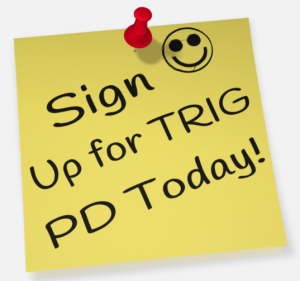Upcoming No Cost* Professional DevelopmentAs a result of the TRIG Device Purchasing Activity, all education professionals in Michigan are able to take advantage of these cutting-edge professional development courses. Delivered virtually, this PD allows participants to work at their own pace, after classroom hours. Each course is 4 weeks long, with rolling enrollment the first week. All courses have two live webinars. For a complete list of Virtual Course FAQ’s click here. All courses below will be eligible for 6 SCECH credits pending course completion.*$10 SCECH Registration Fee Dec. 1 – Dec. 20 2015: Advanced Social Media Social Media tools offer unlimited opportunities for in-depth authentic learning experiences with powerful real-world connections of curriculum to practical applications. These same tools present a critical responsibility that educators have in developing responsible digital citizens of the students. Participants will explore the use of Social Media based on the highest level for the SAMR model and how best to do such work so that students have authentic experiences with real-world connected learning. Digital Citizenship will be a critical part of how Social Media tools will be appropriately used during the learning journey for course participants and their students. Dec. 1 – Dec. 20 2015: Advanced Application of Next Generation Assessments Michigan educators with a strong existing background in technology integration and Next Generation assessments will participate in a ‘masters class’ through this six-hour virtual course. Participating educators will synthesize high-quality exemplars with their own portfolio of formative and summative assessments to create, implement and reflect on a Next Generation assessment that is grade level and subject area appropriate. Dec. 1 – Dec. 20 2015: Advanced Google for Learning Educators across the globe are capitalizing on Google’s multimedia tools to make their lessons more dynamic, engaging and supportive. Using the top levels of the SAMR model, participants will explore the use of mixing media for creating effective blended lessons. Designing lessons that encourage students to use multimedia Google tools to create authentic products that promote creativity and voice will be will be a critical part of the learning journey for course participants. Dec. 1 – Dec. 20 2015: Intermediate Application of Personalized & Blended Learning Participants will apply their existing experience with personalized and blended toward the creation of an extended lesson, unit and / or assessment on a functional personalized learning platform. Dec. 1 – Dec. 20 2015: Introductory Practices in Literacy Instruction & Technology Participants will explore how Literacy Instruction and Technology foster critical thinking experiences for students. This course will lay the groundwork for effective instructional strategies that support the foundations of literacy and technology integration. Dec. 1 – Dec. 20 2015: Introduction to Next Generation Assessments Educators will understand and facilitate Michigan’s vision for Next Generation assessments by learning and applying appropriate strategies, structures, and support practices through this six-hour virtual course. Participating educators will explore and apply aspects of technology integration, blended learning and data collection toward the creation of a classroom-ready assessment that is conducive to the K-12 environment. Dec. 1 – Dec. 20 2015: Design Thinking Made Practical There is a strong push for developing critical thinking in students through deep inquiry, as well as other College & Career Readiness skills. Design Thinking is an effective methodology that supports innovative approaches to learning as STEM, STEAM, Inquiry-Based Learning, Project-Based Learning, and other structures that emphasize standards-based authenticity and student voice. Dec. 1 – Dec. 20 2015: Introduction to Applying Google Apps for Education This is an online program that participants will install, explore and apply up to fifteen new Google Apps and/or Chrome extensions that enable them to leverage the integration of Chromebooks in their classrooms. Dec. 1 – Dec. 20 2015: Intermediate Social Media Social Media tools are a powerful way to support educators to improve instructional practices. Teaching tends to be a “lonely” profession because there tends to be limited time for professional collaboration during the school day. Social Media tools are opportunities to connect educators to the resources they need, including collaborating with their colleagues. These same practices are critical Global Competencies that students need to develop for College and Career Readiness. Dec. 1 – Dec. 20 2015: Professional Development through Social Media In this online course participants will discover and explore a range of common and up-to-date social media platforms as well as establish channels that allow for powerful professional development and innovative leadership. Dec. 1 – Dec. 20 2015: Refining Curriculum with Deeper Learning in Mind (XBL) Participants will learn and apply best practices in project, problem and inquiry-based learning toward the development of a lesson, unit and/or assessment that they will deliver within and beyond their classrooms. |

